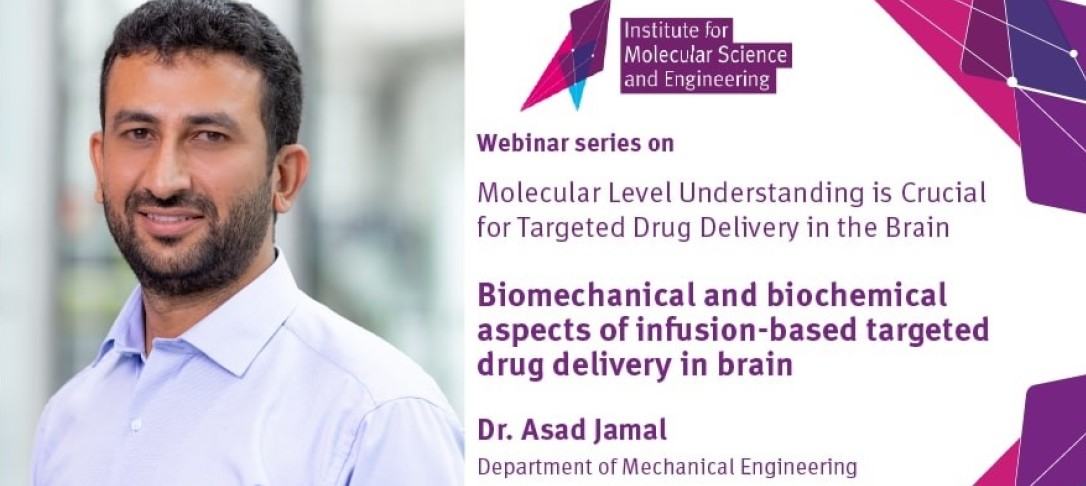
This webinar will be held on zoom. The structure of the event will be a presentation followed by audience Q&A. Please register to be sent the joining instructions. You can pre-submit questions for the Q&A section when registering.
This webinar is part of the series
Molecular Level Understanding is Crucial for Targeted Drug Delivery in the Brain
The theme discussed in this webinar will be:
Biomechanical and biochemical aspects of infusion-based targeted drug delivery in brain
Abstract
Glioblastoma multiforme (GBM), a grade IV glioma, is the most aggressive and frequently diagnosed form of primary central nervous system (CNS) tumour in adults, with an average age of 64. The GBM leads to 250,000 deaths per year worldwide and have poor prognosis due to their location and fast development.
The conventional therapies suffer from limitations e.g., passing drugs through the blood-brain barrier (BBB), unwanted drugs distribution throughout the tissue due to passive diffusion and poor delivery to the target or are not viable because of severe side effects e.g., localised tissue damage.
The infusion-based targeted drug delivery by robotically steerable needles provides an opportunity to overcome these challenges. Advances have been made; however, ultimate success in the clinical applications remains a challenge due to poor understanding of drug flow and distribution behaviour in complex brain tissue.
The focus of this webinar is biomechanics of infusion-based drug delivery and importance of molecular level processes that influence the flow and distribution mechanisms in complex brain tissue.
Biography
Dr. Asad Jamal
Faculty of Engineering, Department of Mechanical Engineering, Research Associate
Dr Asad Jamal is in the Tribology Group, Department of Mechanical Engineering, Imperial College London. He is interested in experimental research on biomechanics and drug delivery in soft tissues. He is collaborating with colleagues from Department of Bioengineering and investigating the consequences of molecular processes on the mechanisms of infusion-based drug delivery. His seminal work on biomechanical aspects of infusion mechanisms in brain white matter tissue has been previously featured on Imperial’s main page and selected as featured article by IEEE TBME.
Other webinars in the Molecular Level Understanding is Crucial for Targeted Drug Delivery in the Brain series
-
Other webinars in the Molecular Level Understanding is Crucial for Targeted Drug Delivery in the Brain series
- 30 November 16.00 Biomechanical and biochemical aspects of infusion-based targeted drug delivery in brain Dr. Asad Jamal (Department of Mechanical Engineering)
- 14 December 14.00 Nanoparticles for treatment of Tuberculous Meningitis Professor. Alexandra Porter (Department of Materials) and Dr. Alessandra Pinna (Department of Materials)
- 18 January 16.00 Antibody Discovery vs Neurodegeneration Dr Francesco Antonio Aprile (Department of Chemistry)
- 25 January 16.00 Noninvasive drug delivery to the brain using short pulses of ultrasound Dr. James Choi (Department of Bioengineering)
- 1 February 16.00 Development of the bacteria viruses, bacteriophage, into a delivery technology for therapeutic nucleic acids against cancer and other human diseases Professor Amin Hajitou (Department of Brain Sciences)
- 8 February 16.00 Professor. Daniele Dini (Department of Mechanical Engineering) and Professor. Ferdinando Rodrigues y Baena (Department of Mechanical Engineering)
About The Institute for Molecular Science and Engineering
The Institute for Molecular Science and Engineering (IMSE) is one of Imperial College London’s Global Institutes, drawing on the strength of its four faculties to address some of the grand challenges facing the world today. The Institute’s activities are focused on tackling problems where molecular innovation plays an important role.
If you have any questions about accessibility requirements please email Leah Adamson (IMSE Events Officer) on l.adamson@imperial.ac.uk